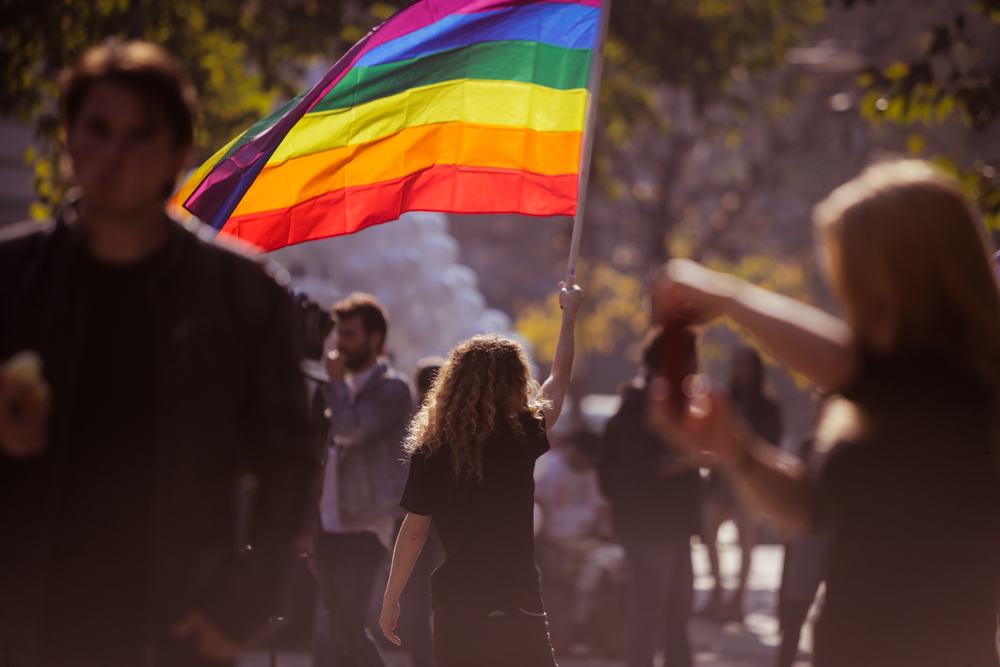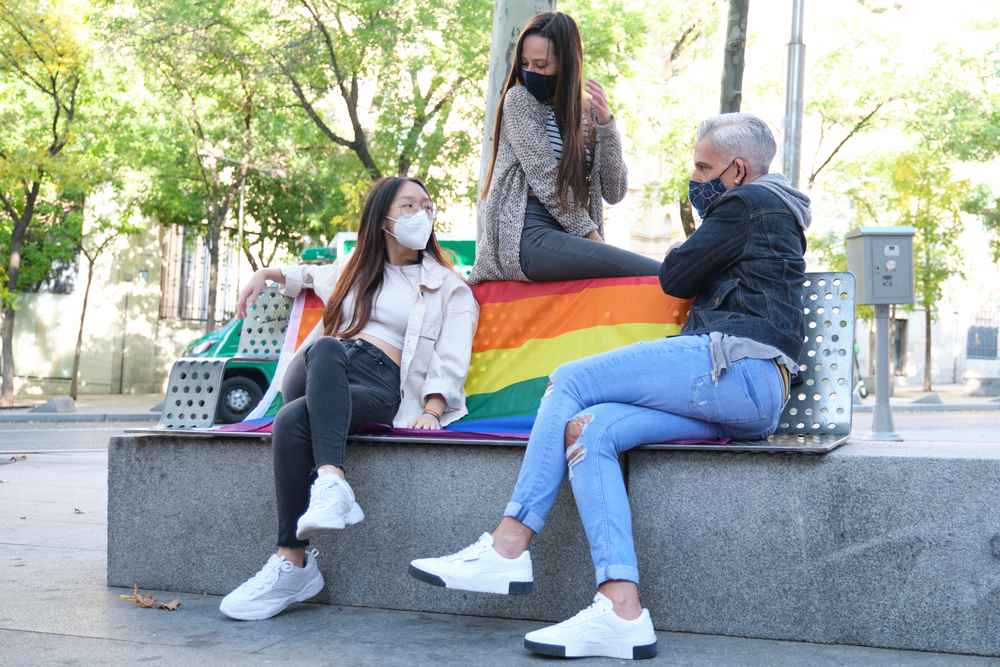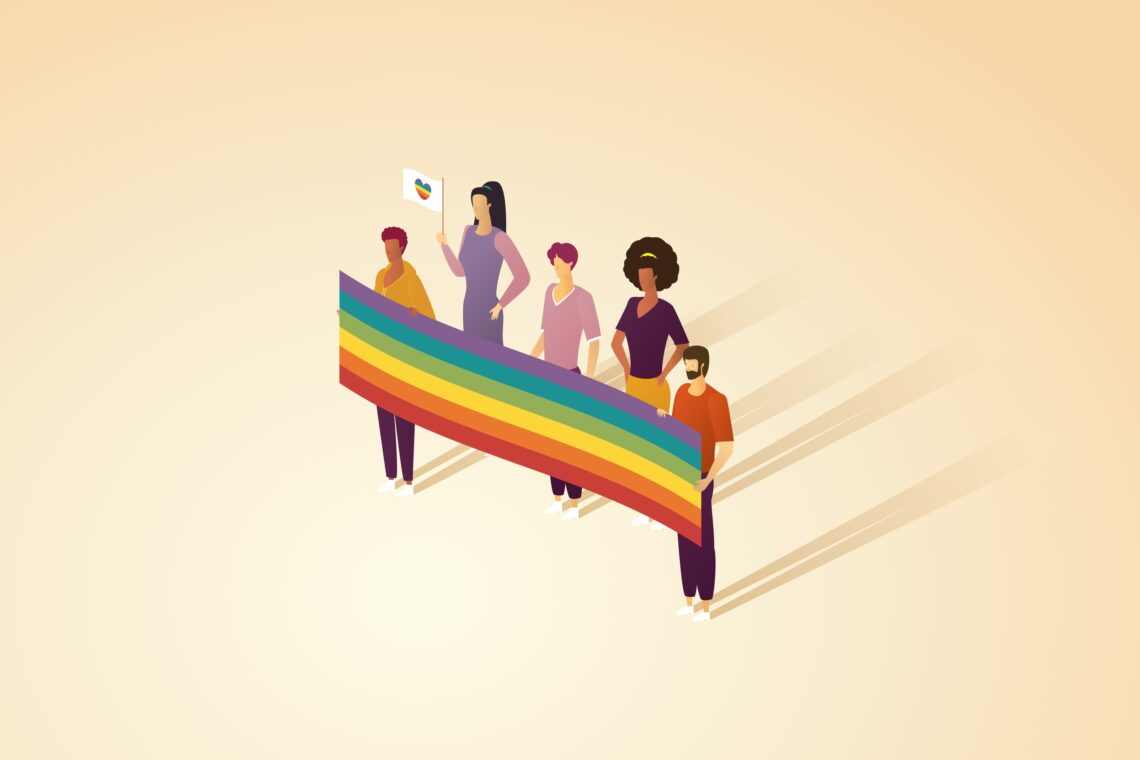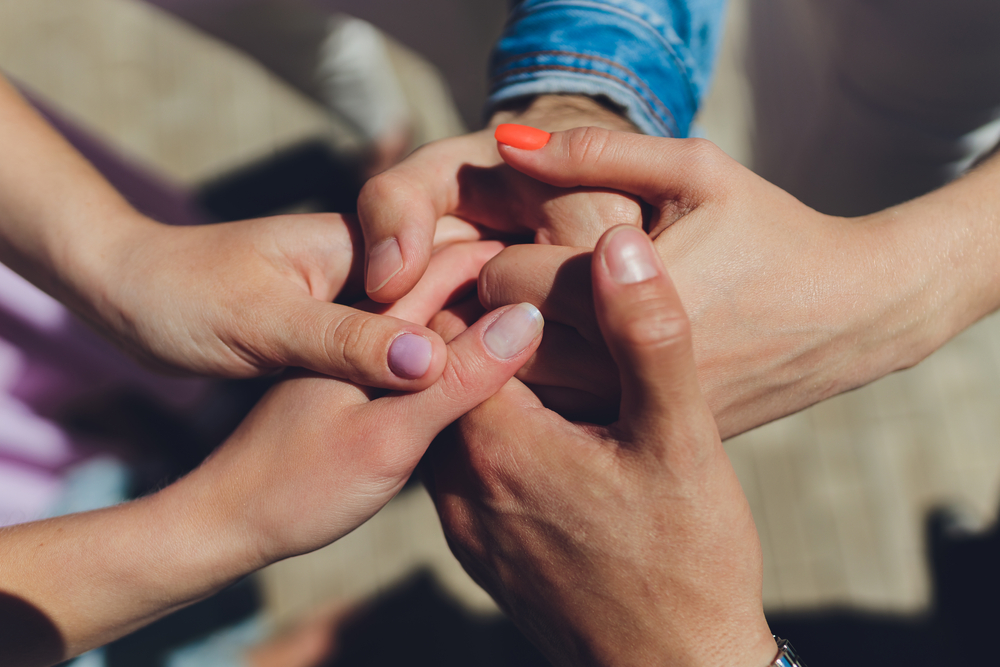Lesbian, gay, bisexual and transgender (LGBT) people and other asylum seekers fleeing persecution in their home countries experience abusive and dangerous conditions in Mexicowhen not allowed to cross the border to seek asylum, Human Rights Watch said today.
Two policies implemented by the administration of former President Donald J. Trump – the Migrant Protection Protocols, commonly known as “Remain in Mexico,” and the Title 42 summary expulsion policy – continue to be used under the Biden administration to block access to the asylum system for most people who try to cross into the US to seek safety. This includes people at a greater risk of harm in Mexico because of their particular conditions or identities, including gender identity or expression, disability, and age who should be entitled to an exception from expulsion. US authorities should stop sending asylum seekers to Mexico or expelling them to their countries of origin and should quickly process people waiting at the border to seek asylum who are at particular risk of abuse.
“The United States should restore access to asylum for all, but so long as Biden is blocked from doing so, he should at the very least immediately use existing exceptions for at-risk asylum seekers, including LGBT people,” said Ari Sawyer, US border researcher at Human Rights Watch. “Continuing to summarily expel LGBT and HIV-positive asylum seekers to Mexico or their country of origin places their lives at serious risk.”
US government protocols include exceptions for asylum seekers at a greater risk, and President Joe Biden has promised US agents will apply them. But border agents have broad discretion to grant or deny exceptions, and there are no clear consequences for agents who fail to do so or checks to ensure that exceptions are being handled properly, Human Rights Watch found.
Despite a recognition by the US Department of Homeland Security (DHS) that LGBT people may face “increased risk of harm in Mexico due to their sexual orientation or gender identity,” Human Rights Watch documented cases in which border officials returned LGBT asylum seekers, including those with HIV, to Mexico under both abusive anti-asylum policies.
Human Rights Watch conducted 29 interviews with asylum seekers, migrants’ rights groups, and United Nations agency officials in April and May 2022, in person and by phone, in Ciudad Juárez and Mexico City, and in El Paso, Texas. Human Rights Watch undertook research in coordination with Casa de Colores, a US-Mexican organization working to provide shelter and legal services to LGBT asylum seekers.
LGBT asylum seekers told Human Rights Watch they had been expelled even after expressing their fear of returning and telling border agents they identified as LGBT, had HIV, or had experienced abuse related to their gender identity, gender expression, or sexual orientation. They also described serious abuse during their journeys to the border, including by Mexican officials.
One woman interviewed fled to the United States from Honduras, where she previously faced targeted violence for living openly as a lesbian woman, including one incident when someone cut her face, leaving a large scar. Near the US border, people she believed to be members of a Mexican cartel kidnapped her and forcibly took nude photos of her.
She said that when she explained to US border officials that she was a lesbian seeking asylum from Honduras and that she had also experienced abuse in Mexico, agents laughed at her. She said one agent told her, “I don’t care what’s happening to you.” She was expelled to Honduras, and immediately fled again to the US border, this time afraid to seek asylum for fear of being returned to Honduras again.
Previous Human Rights Watch research has highlighted the risk of illegal and arbitrary arrest, torture, extrajudicial execution, sexual assault, and enforced disappearance for LGBT people in Central America.
Although the Biden administration has moved to terminate both Title 42 and Remain in Mexico, several US state officials have filed suits in federal court, resulting in orders to keep the programs in place during the litigation.
A federal district court judge has temporarily blocked the Biden administration from ending the expulsion policy, which was first issued at the start of the Covid-19 pandemic against the recommendation of top public health experts. There is no evidence that people seeking asylum pose a public health threat to the United States, and the expulsion policy cannot be justified on public health grounds.
Though the initial Title 42 was issued without “notice and comment” procedures, allowing a period for the public to comment, the judge found that the Biden administration should have gone through these administrative consultation processes to end Title 42. Some US lawmakers have proposed legislationthat would keep summary expulsions in place until pandemic public health measures are terminated.
Asylum seekers and other migrants sent to Mexico are often unable to support themselves or access basic services such as shelter, food, water, safe transportation, or health care, and have no meaningful recourse for abuses from criminal cartels or Mexican authorities. In the Mexican state of Tamaulipas, Human Rights Watch found that asylum seekers and other migrants are systematically targeted for kidnapping, extortion, rape, and other violence, by both government officials and criminals.
LGBT people constitute one particularly at-risk group of asylum seekers, among others, including people with disabilities and chronic health conditions, Black and Indigenous asylum seekers, asylum seekers who do not speak Spanish as a first language, and families traveling with children.
LGBT asylum seekers and asylum seekers with HIV described additional discrimination and abuse as well as barriers to accessing essential services, including life-saving antiretroviral therapy and gender-affirming health care, services that include medical and mental health services, continuation of hormonal treatment, and other services for transgender and nonbinary people that are crucial to their health and well-being.
National Migration Institute’s Letter of Response to HRW 5.31.22 (In Spanish)
Human Rights Watch asked Mexico’s National Migration Institute for more information on allegations made against immigration agents. The agency responded on May 31 and said they were unaware of any reports of such abuses, were not able to investigate them, and that the Mexican constitution prohibits such behavior.
The United States has an obligation to protect refugees from returning to a threat of persecution, ill-treatment, and threats to life and safety, Human Rights Watch said. President Biden should ensure that the United States complies with its domestic and international legal obligations to respect the right to seek asylum.
“LGBTQ+ and HIV-positive asylum seekers face grave risks to their health and safety from the time they flee their countries, often after years of targeted abuse, to when they arrive at the US border,” said Susana Coreas, director of Casa de Colores. “Biden has rightly committed to protecting LGBTQ+ refugees. He should follow through on that promise and ensure all asylum seekers are welcomed with dignity at the border.”
Abuse at the US Border
Human Rights Watch spoke with 20 LGBT asylum seekers in Ciudad Juárez, Mexico, who hoped to cross into the United States and be allowed to seek protection. Nearly all reported they were not approaching the border or trying to ask US officials for asylum because they feared they would be expelled to Mexico or their country of origin. They said they preferred to wait for the Biden administration to restore access to asylum or for legal aid to make a request for exemption from the expulsion policy. Four asylum seekers reported that they had previously been expelled to Mexico or their country of origin without an asylum screening.
When Adolfo H. and Gerardo C., a gay couple fleeing Cuba and El Salvador, respectively, who like others interviewed are not identified by their real names for their protection, tried to seek asylum at the US border in February 2022, they were expelled by US Customs and Border Protection (CBP) agents to Mexico. They had previously experienced extortion several times by Mexican immigration agents, who stopped them at various points along their journey and demanded payment to continue. At the time, they were not yet married. US officials told the couple that Adolfo could stay and seek asylum in the United States because he is from Cuba but that his partner would be expelled, even though border officials had the authority to allow both men in. Instead, they gave them the option of being separated or of being expelled together. They said that while they were in custody, US officials told them to stop holding hands or touching one another. Faced with the prospect of being separated again, they got married in Mexico, hoping that given another chance, they would be allowed to seek asylum together.
- José M., a gay man who fled death threats in Honduras based on his sexual orientation, said he had tried to cross the border in March 2021. He was afraid to stay in Mexico, where he said he has experienced extortion and violence at the hands of Mexican police and discrimination at shelters. On his way to the border, Mexican immigration agents stopped the bus he was on and made everyone get off, he said, forcing each migrant to pay a bribe of about US$25 each or be expelled from the country. He also said that because of his gender expression and sexual orientation, some shelters did not allow him to stay there, leaving him to sleep on the streets. In Ciudad Juarez, the shelter operators told him it was a sin to be gay and said that if he and other LGBT asylum seekers didn’t go to religious service, they would be forced to leave. He said he had told US border officials that he is gay and that he was afraid to be sent to Mexico, but hours later CBP agents sent him to Mexico. Before expelling him, US officials made him throw away everything he had, including the few clothes he had. US border agents typically throw away migrants’ possessions, including items such as medicine, baby blankets, important identity documents, documents needed to prove an asylum claim, and memorabilia that hold sentimental value, claiming the practice is for health and safety reasons.
The Biden administration has also recently placed some LGBT people in the Remain in Mexico program, officials with the International Organization of Migration (IOM) told Human Rights Watch, sending them to Ciudad Juárez despite the exemption for LGBT people and others at particular risk of abuse. IOM operates a shelter for newly expelled or returned asylum seekers to test them for Covid-19 and provide quarantine before they move on to other shelters. IOM officials said LGBT asylum seekers had been sent to Mexico even after they explicitly told US border agents about their gender identity or sexual orientation.
Abuses in Country of Origin
LGBT asylum seekers interviewed reported serious abuses in their countries of origin, including rape, assault, death threats, extortion, and forced disappearances or killings of romantic partners and friends.
- Juan C., a transgender man, fled Honduras after he received death threats related to his gender identity and activism in an LGBT rights organization. He said that several LGBT people he has known have been killed or disappeared there. He said that the police detained him without charges on several occasions. In 2021, two men raped him and his girlfriend after saying, “Who is the man and who is the woman in the relationship?” and saying that the couple were transgender and lesbian only because they had not had sex with a man. “They said, ‘We are going to make you women,’” Juan said.
- Eduardo O., a gay man from Honduras, said he fled the country shortly after gang members beat his romantic partner to death. Gang members had previously threatened to kill Eduardo. Then in June 2021, the same gang members attacked him and his partner while they were together. While Eduardo was able to escape, he said, his partner could not. He said he reported his partner’s murder to the police, who did not investigate.
- Kayla R., a transgender woman from Guatemala, said she had to flee and seek asylum after the gangs who were extorting the business where she worked beat her when she and the store owner couldn’t pay, leaving prominent scars on her face. On another occasion, gang members beat her in the street while using anti-LGBT slurs. They left a large gash and scar on her head.
Discrimination and Abuse in Mexico
Human Rights Watch also documented serious abuse and discrimination against LGBT asylum seekers in Mexico. Several LGBT asylum seekers said that Mexican immigration agents, police, and National Guard soldiers targeted them for extortion. Other asylum seekers experienced kidnapping, sexual assault, robbery, and other physical violence by both Mexican government officials and criminals.
- Brenda F., a transgender woman, fled El Salvador in 2017 after gang members who wanted her to sell drugs beat and threatened to kill her. After applying for protection and living for a few years in Mexico, she said she was riding a bus from Monterrey to Matamoros in the Mexican state of Tamaulipas in May 2020 when, at a checkpoint, immigration agents pulled her off the bus and took her into an office about 25 meters away. While another immigration agent stood watch outside the office, the agent questioned her about her destination and reason for traveling, she showed him an order from a doctor for laboratory tests. He accused her of lying and of wanting to cross into the United States and grabbed his genitalia, saying if she wouldn’t “give me what I want,” he could have two police officers expel her to Guatemala. Afterward, he told her that if she reported him, he had already taken a photo of her identification and would come after her. She said she knows other trans women who have experienced sexual assault at the hands of Mexican immigration agents.
- Mariana L., a lesbian woman who fled Honduras in 2021, said she was kidnapped for ransom in January 2021 and held for over a week near the US-Mexico border by people she believed to be cartel members. They took her to a house in Reynosa, Tamaulipas, where she saw several other kidnapped migrants. She said they stole her passport and forcibly photographed her naked until her sister managed to pay a ransom of US$3,000. Her kidnappers would hit her to make her cry when they called her sister for the ransom money.
- When Erika L., a lesbian woman, and Samuel B. and Martin G., gay brothers from El Salvador, arrived at the Mexico-Guatemala border in January 2022, a group of men kidnapped them. On the Mexican side of the border, the men raped Erika while beating her friends and forcing them to watch. They went to the Mexican Commission for Refugee Assistance (COMAR), Mexico’s refugee authority, in Tapachula, Chiapas, where they applied for asylum in Mexico. COMAR gave them a document confirming that they were in the process of seeking asylum in Mexico, giving them legal status in Mexico. An immigration agent apprehended them outside the COMAR office as they left. When he saw their application documents, he tore them up, saying they were meaningless and sent them to a detention center. They were released and then took a bus to the US-Mexico border. They said Mexican immigration agents periodically stopped the bus and boarded it to extort them and other migrants, saying they had to pay if they wanted to continue their journey to the US border.
- Kayla R., the transgender woman who fled Guatemala, said that in July 2021 Mexican state police in Piedras Negras robbed her and beat her with batons so badly that she was ultimately hospitalized and vomited blood. The police detained her and another transgender woman she was traveling with for two days without food and water and then turned them over to immigration agents, who sent them to an immigration detention facility. There, she said, a Mexican immigration agent told her she should report the crime, which would make her eligible for a one-year humanitarian visa, giving her legal status in Mexico. She said she would like to do so, and that the agent took down her information but never gave her any paperwork or began any immigration process. Instead, after she reported the crime, Mexican immigration agents returned her to Guatemala, where she had experienced brutal violence. She immediately fled again. While she was making her way back to the US border in March 2022, criminals threatened her with a machete and robbed her.
Six asylum seekers and migrant rights workers reported that some of the shelters in Ciudad Juárez that accepted LGBT asylum seekers subjected them to discriminatory treatment, including the shelter where LGBT asylum seekers were forced to go to Christian religious services. Shelters in Ciudad Juárez are at capacity, meaning they would be homeless if they did not agree to go to the service. Some migrant shelters in Ciudad Juárez would not accept LGBT asylum seekers at all, migrant rights workers there said.
Accessing lifesaving health care for asylum seekers with HIV or other chronic illnesses was also difficult, asylum seekers said. All five HIV-positive asylum seekers interviewed, and one asylum seeker with diabetes and hypertension, said they had gone periods ranging from a few weeks to four months, without their necessary medication because they did not have any money or support.
- Mari R., a transgender woman who is HIV positive and who fled Honduras after she refused to sell drugs for a gang whose members had raped and threatened to kill her, went without her antiretroviral medication in Mexico for four months. In April, with the support of Derechos Humanos Integrales en Acción (DHIA), a local migrant rights organization, she was finally able to see a doctor, who told her that her condition had significantly worsened. The day after Human Rights Watch spoke to her, she was hospitalized.
Four transgender asylum seekers, as well as IOM officials and a local trans rights organization called Red Solidaria Trans, said that transgender asylum seekers have not had access to gender-affirming health care in Ciudad Juárez.
- Brenda F., a transgender woman who fled after facing an attempted gang recruitment and death threats in El Salvador, said she had previously been taking hormones but that in Ciudad Juárez, she has not been able to access to gender-affirming hormone care, though she has repeatedly tried. “They always say they don’t offer that care, they can’t, or they don’t know how,” she said. Transgender people who take hormones to develop secondary sex characteristics consistent with their gender identity and expression experience a reversal of these physical traits when hormone therapy is stopped, which can cause distress among other symptoms. Brenda said she hasn’t had access to hormone care since October 2021 and that she is suffering from depression as a result. “I have asked for help getting my hormones and they have said they don’t offer that kind of support here [in Ciudad Juárez],” she said. “We are suffering marginalization in that way – hormone treatment is necessary, and they are denying us.”
Recommendations
To the Biden Administration
- Continue and redouble efforts to end the Remain in Mexico program and Title 42 summary expulsions, including by initiating a “notice and comment” rulemaking process to end Title 42.
- While these abusive policies remain in place, ensure that border agents do not to return at-risk asylum seekers under the Remain in Mexico program or expel them under the Title 42 summary expulsion policy. People at particular risk of harm include LGBT asylum seekers; those with HIV, disabilities, and chronic health conditions; Black and Indigenous asylum seekers; those who do not speak Spanish as a first language; and families traveling with children.
- Take immediate steps to parole into the United States all LGBT asylum seekers and other asylum seekers at particular risk of harm who have previously been subjected to the Remain in Mexico program or the Title 42 summary expulsion policy.
- Review regulations, Board of Immigration Appeals and Attorney General decisions, and policies and other guidance, rescinding or amending as appropriate to ensure consistency with the right to seek asylum and the right to protection from return to harm or threat of harm as defined in the Refugee Convention, the Convention against Torture, and the International Covenant on Civil and Political Rights.
- Continue to increase the number of appropriately trained personnel – asylum officers, doctors, child-care specialists, mental health services professionals and other first responders – at the border using funds currently allocated toward immigration enforcement and detention.
- Beyond initial screening of migrants, transfer humanitarian reception, including migrant processing and asylum functions, from CBP to a separate government agency, such as the Federal Emergency Management Agency (FEMA), or groups with trauma-informed training and whose mission is to perform humanitarian services.
- Take steps to ensure that LGBT asylum seekers and asylum seekers with HIV feel safe enough to self-identify while in the custody of CBP, including by ensuring that US officials affirmatively explain a policy of nondiscrimination and ask each migrant if they would like to share their gender identity and sexual orientation.
- Investigate and discipline US border agents who wrongfully send LGBT asylum seekers and other particularly at-risk asylum seekers to Mexico or their countries of origin.
- Work with Mexico and other governments to implement a holistic regional plan for access to protection and safe and dignified migration.
To the US Congress
- Reject proposed legislation introduced by Sens. James Lankford (R-Oklahoma) and Kyrsten Sinema (D-Arizona) to keep Title 42 in place until after the government’s Covid-19 emergency declaration is terminated.
- Enact legislation to end the Title 42 summary expulsion and Remain in Mexico policies.
To the Mexican Government
- End the practice of accepting non-Mexican nationals sent to Mexico by US authorities under the Remain in Mexico and Title 42 summary expulsion policies.
- Investigate abuses by Mexican immigration agents, including reports of extortion at immigration checkpoints, and take disciplinary action against any found to have been involved in such conduct.
- Ensure that Mexican immigration agents do not expel people who may need international protection without due process and screening for fear of return to potential harm.






